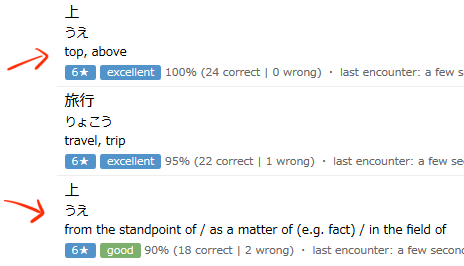When I answer the question in English, the definition of 上 seems to be じょう's definition, but when… - Feed Post by Ametrine
When I answer the question in English, the definition of 上 seems to be じょう's definition, but when I am asked to translate "top" to Japanese, the answer is うえ.


posted by Ametrine March 5, 2016 at 5:29am
Comments 2
 The 上【うえ】"top, above" question is from Vocabulary chapter 13. The English meanings listed for Vocabulary questions have been written in manually by Beeant.
The 上【うえ】"top, above" question is from Vocabulary chapter 13. The English meanings listed for Vocabulary questions have been written in manually by Beeant.
The 上【うえ】"from the standpoint of / as a matter of (e.g. fact) / in the field of" question is from Kanji chapter 10. For Kanji questions, the English meanings come from a more-or-less completely automated process, getting the first matching meaning found in a dictionary, if the question text is even in the dictionary (otherwise no meaning is listed at all—such as what happens with many place name or long phrase Kanji questions).
You might remember from the previous version of JCJP that we didn't even have meanings listed for Kanji questions when doing Practice. Having English meanings is obviously important for Vocabulary questions; but back then we didn't have them for Kanji questions, since Kanji questions are testing you only on picking a valid reading of the question.
Now we have these automated readings being shown, which is a nice added bonus bit of information. However, for some reason it seems that only one argument was used in the automated dictionary search query. It seems to have only used the question text for the search string, which means in some questions (like this one you've shown) it matches the wrong meaning for the specific reading of the kanji. If instead two search parameters had been used—both the question text "上" AND the answer reading kana text "うえ"—then it probably wouldn't have had this problem.
So it's best to take the English translations of Kanji questions with a pinch of salt, since they it is just surpluss extra information. Only the reading alone is the true purpose of the Kanji questions. ^^March 5, 2016 at 6:35am Ah, I see. Thank you for explaining how it works. I will try to be careful memorising things correctly with kanji questions.March 5, 2016 at 7:02am
Ah, I see. Thank you for explaining how it works. I will try to be careful memorising things correctly with kanji questions.March 5, 2016 at 7:02am
